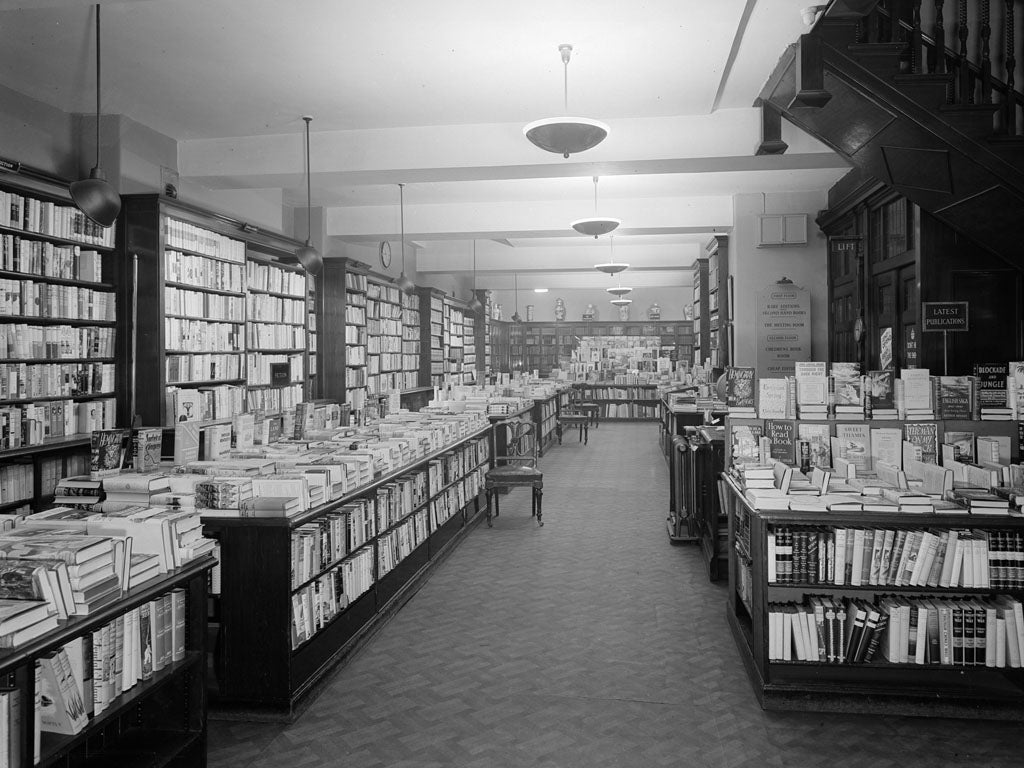I might just be on the scent of what will guarantee the future of the bookshop
The short-tailed baboon of Sumatra stands a better chance of survival than Hatchards


It was all go at my local Waterstones this week. Now there’s a sentence you don’t get to write often. It was all go because an author was in for a signing, and he’d brought his friend along. He was James Bowen, former vagrant, former druggie, sometime Tube-station busker and now bestselling author of A Street Cat Called Bob.
If the charmingly diffident Bowen weren’t enough of a draw, he’d brought the titular ginger tom with him. It sat on a table and, through shrewd green eyes, surveyed the long line of soft-hearted Londoners as they queued for a signature, a chat and a paw print. Beside the entrance doors a rare phenomenon could be seen: a second cat author, with a self-published memoir and another eponymous moggy, hitching a ride on the celebrity of James and Bob.
Is this what it takes to get people into bookshops now? To get them into bookshops and buy a flipping book, rather than peruse the paperbacks before going home and ordering one on Amazon? Is there a large enough production line of cute-pet books, smiling-TV-chef books and Miranda Hart autobiographies to guarantee the personal appearances and signings that are the lifeblood of modern bookshops?
Because that lifeblood is thinning fast. According to Real Business website, the number of British high-street bookshops has more than halved in the past seven years. In 2005 there were 4,000; last year 1,878. In a couple of years there’ll be only 1,000 left. Unimaginably, the bookshop will be going the way of the record shop and video store. When it comes to threatened extinction, the short-tailed, pink-eyed, vegetarian, gay albino baboon of Sumatra stands a better chance of survival than Daunt and Hatchards.
We know the problem. Sales of print books are falling, while sales of ebooks doubled last year. And, being unable to fight the Amazonian dragon (which sells both print and ebooks) the physical bookshop has to maximise other things: customer service, the know-all-ness of the staff, plus any stratagems it can invent to persuade customers to a) stick around and b) hit the tills and spend money.
Other countries have toyed with direct action. In Manhattan, fans of St Mark’s bookshop in Third Avenue started an internet petition to persuade Cooper Union – which owns the building that houses the bookshop – to lower its rent, just from sheer, well, cultural responsibility. You could imagine how well that went down.
The Bookseller brings news from Venice that the existence of four of La Serenissima’s most famous bookshops is now threatened – even the venerable Goldoni emporium can’t survive rent and rates increases flooding in like the River Po over St Mark’s Square. Incensed, 100 local authors have signed a manifesto demanding the city save its bookshops rather than turn all its retail space over to tourism. Other ideas include holding flash-mob events and blacking out bookshop windows to draw attention to the plight of the librerie.
In the midst of this hubbub of conscience-pricking and aggression, one idea stands out for its completely off-the-wall quality. It’s a solution to the bookshop problem that anyone can try, and its cost is minimal. In Belgium, according to Salon.com, researchers have found that bookshop customers spend more time browsing – and buying books at the end of their perusal – if their nostrils are given a whiff of chocolate. No kidding. In experiments, whiffs of cocoa solids were introduced into a bookstore and the reactions of customer monitored. Usually such people would look for a single title, pay for it and vamoose. But once they’d got the scent, they slowed down appreciably, looked at several titles and chatted with the staff.
Chocolate! Is that the answer? When all other arguments – that a bookshop is the aorta of a community; that if you don’t support your local bookseller by giving him, not Amazon, your money, he will surely close – have failed, we fall back on the seductions of atmosphere.
This suggests that readers are like house-buyers who feel well disposed towards a property because it smells of roasting coffee beans when they enter it. That can’t be right. These are readers of books, for heaven’s sake, clever, sensitive people. They would never be impressed or taken in by any psychological manipulation.
Would they? Suddenly I’m not so sure. For what is fiction except psychological manipulation – an author playing with a reader’s unslakable desire to be pleased, beguiled, transported. And if I look again at the Belgian researchers’ study, I see it reports that sales of food or drink books rose by 44 per cent when the smell of chocolate was in the air – and sales of romance novels rose by 22 per cent. Sales of history books or crime fiction, however, did better when the chocolate aroma was absent.
Oh God. You know what this means? It means that, armed with these findings, the bookselling world will now go crazy looking for appropriate smells for certain genres. A smell of tea and Hobnobs to go with classic murder mysteries? A pong of cordite, sweat and horse dung to accompany histories by Anthony Beevor? Bookshops, mark my words, will pamper customers like never before, because their shops offer something Amazon can never offer: atmosphere. For what does Amazon smell of? Going by the name alone, I’m getting single-breasted jungle warrior’s armpit.
Join our commenting forum
Join thought-provoking conversations, follow other Independent readers and see their replies
Comments
Bookmark popover
Removed from bookmarks